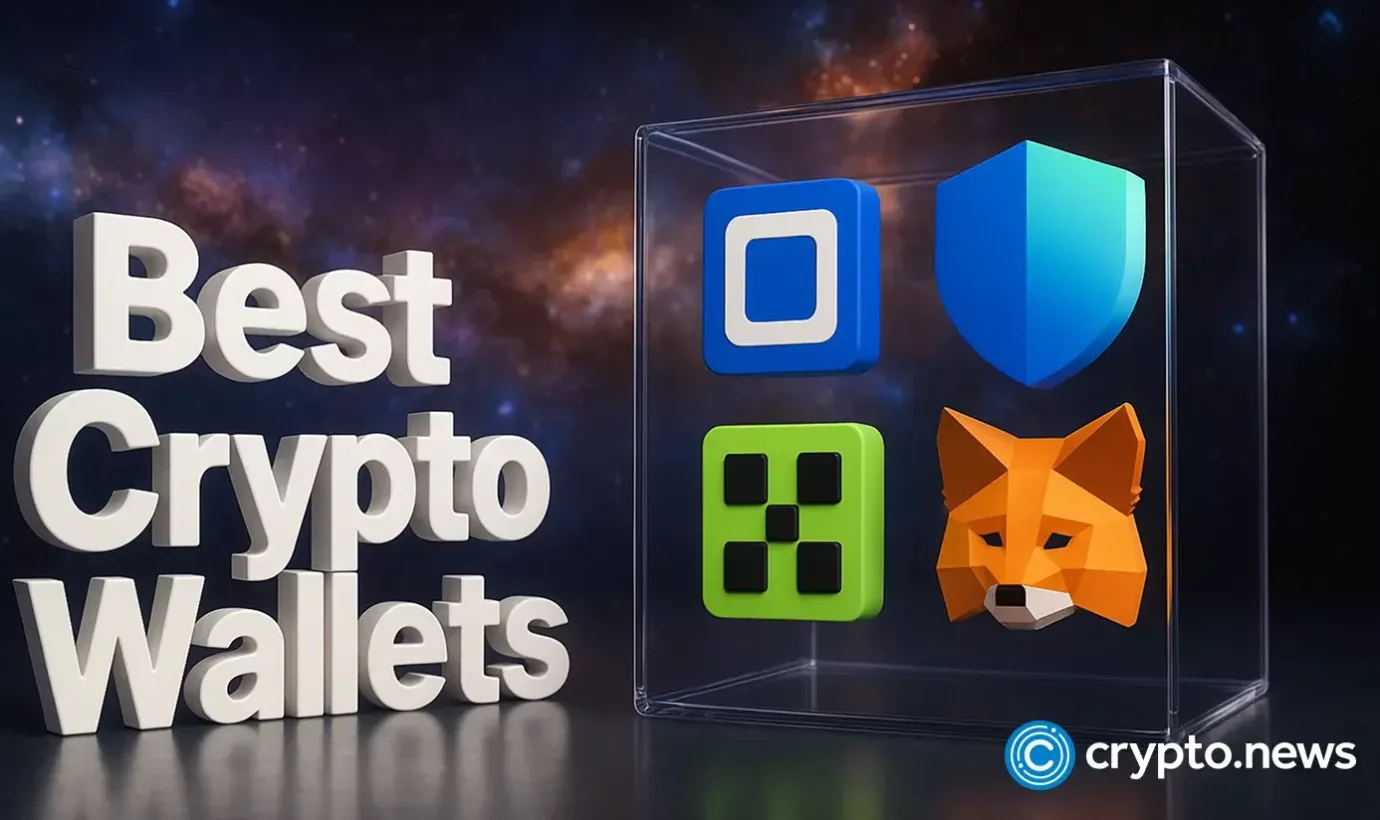8 best crypto wallets of February 2026

The number of cryptocurrencies and their popularity just keeps growing. These days, crypto wallets are considered one of the easiest ways to receive or send crypto — whether it’s your paycheck or any other money transfer.
It’s smart to have a crypto wallet just in case, mainly to keep your money safe (as long as you remember your login code, of course). In this article, we’ll break down the best crypto wallets of February 2026.
Since storing digital money requires solid protection, crypto wallets are the go-to solution. That’s why we’ve put together a list of top wallets, taking into account their versatility, ease of use, and security.
8 top crypto wallets of February 2026

Pros & Cons
- Industry-leading security (first open-audit secure element)
- Great usability with wireless charging
- Open-source firmware
- Higher cost than most wallets
- Overkill for small investors
Review
Coins supported: 1,000+ coins and tokens plus all your ERC-20 tokens and NFTs through Trezor Suite.
Security features: Features an open-audit secure chip, quantum-ready firmware, wireless charging and Bluetooth, touchscreen controls, PIN and passphrase protection, plus offline signing for extra safety.
Price: Approximately $249 / €249
Best for: Long-term investors and high-value holders needing cold-storage peace of mind.

Pros & Cons
- Maximum security for your keys
- Supports a wide range of coins and tokens
- NFC and Bluetooth make it convenient on the go
- High cost
- Recent multisig feature fees have sparked some complaints
Review
Coins supported: 5,500+ assets across 30+ blockchains, including BTC, ETH, SOL, BNB, AVAX, and ERC-20 tokens.
Security features: EA L6+ secure element chip, Clear Signing for on-device transaction verification, and an E-Ink touchscreen with NFC and Bluetooth.
Price: Approximately $179 / €179
Best for: Portfolio managers or advanced users who want robust security and flexibility across multiple assets.

Pros & Cons
- Broad multi-chain support and easy onboarding
- Integrated access to dApps, NFTs, and payments
- Some users report transition issues during rebrand
- Hot wallet — less secure for large holdings
Review
Coins supported: BTC, ETH, SOL, DOGE, and thousands of ERC-20 and Base-chain tokens
Security features: Non-custodial wallet with 2FA, biometric login, hardware wallet support, and encrypted local storage.
Price: Free (network and swap fees apply)
Best for: Anyone new to crypto who wants a modern, all-in-one wallet that connects to the Base ecosystem.

Pros & Cons
- Great multi-chain DeFi integration
- Strong security for a hot wallet
- Regular audits and open-source components
- Features aren’t available in every country
- A bit more complicated for new users
Review
Coins supported: BTC, ETH, SOL, AVAX, TON, NEAR, plus EVM and non-EVM chains
Security features: Fully non-custodial wallet with a risk-token scanner, malicious-contract filters, multi-sig and social recovery options, plus hardware wallet integration.
Price: Free (software wallet)
Best for: DeFi users and NFT traders looking for flexible, non-custodial wallets

Pros & Cons
- Great value for hardware security
- Broad token and chain support
- Easy-to-use mobile app
- Mobile-first, no desktop client
- Interface less polished than Ledger or Trezor
Review
Coins supported: 30,000+ tokens and 100+ blockchains (BTC, ETH, BNB Chain, SOL, TRON, Polygon, etc.)
Security features: Air-gapped QR-code signing (no USB/Bluetooth on S1), secure element chip, recovery seed backup, and a mobile app for managing your portfolio.
Price: Approximately $50–$99
Best for: Users on a budget who want multi-chain hardware security

Pros & Cons
- Highest level of mobile wallet security
- No seed phrase management
- Simple recovery and intuitive interface
- Mobile-only; no desktop app
- Limited DeFi integrations
Review
Coins supported: BTC, ETH, SOL, MATIC, and 1,000+ other assets across major blockchains.
Security features: Non-custodial; MPC cryptography; 3-factor authentication; ZenGuard Web3 Firewall; encrypted recovery and face-map verification
Price: Free (network and swap fees apply)
Best for: Users who value top-tier security and simplicity — perfect for those who don’t want to worry about seed phrases.

Pros & Cons
- Supports almost every major blockchain
- Clean mobile interface with DApp browser
- Built-in staking and NFT management
- Hot wallet — less secure than hardware
- Mobile-first; no advanced desktop features
Review
Coins supported: 10M+ tokens across 100+ blockchains, including BTC, ETH, BNB, SOL, AVAX, and Polygon.
Security features: Fully non-custodial, featuring encrypted local storage, PIN and biometric locks, plus the option to connect a hardware wallet.
Price: Free (network fees apply)
Best for: Everyday crypto users who want a reliable, easy-to-use mobile wallet for tokens, NFTs, and staking.

Pros & Cons
- Best integration with Ethereum and EVM networks
- Huge dApp and NFT ecosystem support
- Works on browser and mobile
- Hot wallet — vulnerable if device is compromised
- Interface can overwhelm beginners
- No BTC support
Review
Coins supported: ETH, ERC-20 tokens, and other EVM-compatible assets (BNB Chain, Polygon, Arbitrum, Optimism, Avalanche, etc.)
Security features: Non-custodial wallet with hardware wallet support, encrypted keys, and phishing protection.
Price: Free (gas and swap fees apply)
Best for: Ethereum traders and developers who need full Web3 access
Crypto wallets comparison
Here’s a quick comparison of key factors:
| Wallet | Price | Supported assets | Security features | Best for |
| Base App (formerly Coinbase Wallet) | Free (network and swap fees apply | BTC, ETH, SOL, DOGE, and thousands of ERC-20 & Base-chain tokens | Non-custodial option (you hold your keys or passkey), 2FA, biometrics, hardware wallet integration, encrypted local storage | Beginners wanting a modern all-in-one wallet connected to the Base ecosystem |
| Trezor Safe 7 | ~$249/€249 | 1,000+ coins and tokens (plus all ERC-20s and NFTs via Trezor Suite) | Open-audit TROPIC01 secure element, quantum-ready firmware, PIN & passphrase protection, offline signing, touchscreen | Long-term investors and high-value holders needing cold-storage peace of mind |
| Ledger Nano Gen5 | ~ $179/€179 | 5,500+ assets across 30+ blockchains (BTC, ETH, SOL, BNB, AVAX, ERC-20s) | EA L6+ secure element chip, Clear Signing on device, NFC + Bluetooth, E-Ink touchscreen | Advanced users managing large, diverse portfolios who want robust security |
| SafePal X1/S1 | ~ $50–$99 | 30,000+ tokens across 100+ blockchains (BTC, ETH, BNB Chain, SOL, TRON, Polygon, etc.) | Air-gapped QR-code signing (no USB/Bluetooth on S1), secure element chip, recovery seed backup | Budget-minded users wanting hardware-level security and multi-chain support |
| OKX Wallet | Free (software wallet) | BTC, ETH, SOL, AVAX, TON, NEAR, EVM & non-EVM chains | Fully non-custodial, malicious-contract filters, multi-sig, social recovery, hardware wallet integration | DeFi users and NFT traders seeking a flexible, secure, multi-chain hot wallet |
| ZenGo | Free (network & swap fees apply) | BTC, ETH, SOL, MATIC and 1,000+ assets | MPC key management (no seed phrase), 3-factor recovery (email + cloud + biometric), Web3 Firewall | Users prioritizing top-tier mobile security and seed-phrase-free recovery |
| MetaMask | Free (gas + swap fees apply) | ETH, ERC-20 tokens, and EVM-compatible assets (BNB Chain, Polygon, Arbitrum, Optimism, Avalanche, etc.) | Non-custodial, hardware-wallet compatibility, local key encryption, phishing protection | Ethereum and Web3 power users who need full dApp and DeFi access |
| Trust Wallet | Free (network fees apply) | 10 M+ tokens across 100+ blockchains (BTC, ETH, BNB, SOL, AVAX, Polygon, etc.) | Non-custodial, encrypted local storage, biometrics, PIN lock, WalletConnect support | Mobile users wanting a simple, full-featured wallet with staking & NFT support |
How we picked the most reliable crypto wallets
Finding the top crypto wallets meant reviewing dozens of popular options. We gathered data from public sources — including reports, independent rankings, and user-curated lists — and shortlisted eight wallets for detailed testing.
We also reviewed user feedback to get a full picture of how each wallet performs in practice, helping us highlight their real strengths and weaknesses and shape our final ranking.
FAQ
What is the safest crypto wallet?
There’s no “perfect” wallet that fits everyone. The safest one is the wallet where you’re in charge of your keys and you practice good security — backing up your seed phrase and keeping your device safe. Hardware wallets are generally the most secure, but software wallets are great for everyday use if you stay careful.
Can I store multiple cryptocurrencies in one wallet?
Definitely. Many wallets support multiple coins and tokens — just double-check that yours covers the crypto you actually own.
Hardware vs. software wallet — which is better?
Hardware wallets are safest because keys stay offline. Software wallets are convenient and great for managing multiple assets. Many crypto users combine the two: hardware for long-term storage, software for everyday use.
Disclosure: This article does not represent investment advice. The content and materials featured on this page are for educational purposes only.

















